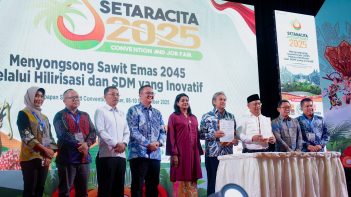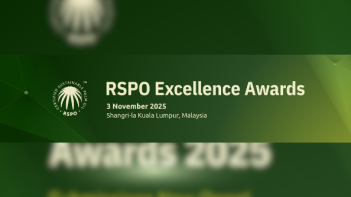We are pleased to announce that the recent RSPO Board of Governors meeting on 8th March 2018 has endorsed the amendment of requirement and guidance for criterion 7.8 under the RSPO Management System Requirement and Guidance for Group Certification of FFB Production.
The amendment was made in order to provide clarity on the GHG assessment requirements and guidance for Group Managers and Auditors.
| P&C Indicator | Requirement for Individual Member with up to 50ha | Requirement for Group Manager | Guidance for Group Managers | Guidance for Auditors |
| Criterion 7.8 New plantation developements are designed to minimise net greenhouse gas emissions. | ||||
| Note on smallholder context: The RSPO Emissions Reduction Working Group (ERWG) and the RSPO SHWG agree that there should be a simplified mechanism for smallholders for compliance on the GHG matters and that smallholders should not be overburdened due to their limited capacity. Further details will be developed. | ||||
|
7.8.1 (M) The carbon stock of the proposed development area and major potential sources of emissions that may result directly from the development shall be identified and estimated.
7.8.2 There shall be a plan to minimise net GHG emissions which takes into account avoidance of land areas with high carbon stocks and/or sequestration options. |
Individual members shall be able to explain how you know where not to plant. |
: The use of maps shall be expected which highlight the avoidance of peat areas and primary forests and where possible mineral soils have been selected for planting. : Demonstrate to a third party that new plantings which occured after April 2013 have where possible been designed to minimise GHG emissions. Groups will need to report confidentially to the RSPO on actions taken to After 31 December 2016 these documents will need to be publically available and linked to 1.2 &
|
The Group Manager should carry out the GHG assessement.
A high carbon stock assessment can be linked to HCV assessments (7.3) Group Manager. For small groups the map can be hand drawn – use description to differentiate areas e.g. Land use types. For larger groups the use of GPS to construct adequate maps should be expected. If the Group Manager is a mill, then mitigation strategies to reduce GHG emissions should be documented. |
See 7.1 Assessing Group Manager Check if the documentation and maps are adequate for the scale of operations. Have all significant aspectswhich could affect GHG emission been identified? Check the document is updated when new members are added to the Group. Check the GHG reporting to RSPO and whether it is publically available (after 31 December 2016). Check that training to individual members has been provided. Assessing Individual Members |
The amended version of this RSPO Management System Requirement and Guidance for Group Certification of FFB Production is available here and also under the Key Document tab on the RSPO website.
Keep reading
RSPO accepted in the Netherlands as a private control system for EUDR

RSPO x JaSPON Conference and Member Engagement Forum 2025 Spotlights Japan’s Sustainability Success and Market Growth
Call for Expression of Interest: Independent Investigation of a Complaint
Call for Expression of Interest: Mexico National Interpretation Task Force for 2024 RSPO Principles and Criteria (RSPO P&C) and Independent Smallholder (ISH) Standard

RSPO–APKASINDO Partnership to Boost Inclusive Growth, Certification, and Market Access for Oil Palm Smallholders

Open Letter to COP30 President: Integrating Forests and Biodiversity: A Policy Central to Paris Agreement Success

Bridging the Auditing Divide: Key Takeaways from the RSPO Assurance Forum 11

Extension of RSPO Excellence Awards 2025 Submission Deadline!





